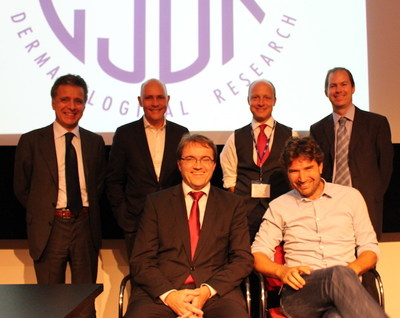ST. LOUIS, Sept. 13, 2017 /PRNewswire/ — In 2016, the World Health Organization issued a report recognizing psoriasis as a chronic, disfiguring, disabling, non-communicable disease that deserves global attention. Yet, the report noted, knowledge regarding the global burden of psoriasis is limited. Psoriasis affects approximately 125 million people worldwide; however, little is known regarding prevalence or incidence of the disease in regions outside of the U.S. and Europe.

Paper authors (Back Left to Right) Luigi Naldi, Chris Griffiths, Carsten Flohr, Darren Ashcroft, (Front) Matthias Augustin, and Tamar Nijsten at the conclusion of the symposium, “The Epidemiology of Psoriasis: Towards a Global Psoriasis Atlas,” held during the European Society for Dermatological Research (ESDR) meeting in Rotterdam, the Netherlands.
A new scientific report, entitled “Global State of Psoriasis Epidemiology: A Workshop Report,” recently published in the British Journal of Dermatology, chronicles the global health challenges in psoriasis epidemiology and highlights the ambitious plan for a web-based Global Psoriasis Atlas (GPA) database that will document the prevalence and incidence of psoriasis worldwide.
This report resulted from a workshop held by the International Psoriasis Council (IPC), a U.S.-based nonprofit organization composed of psoriasis experts from around the world, which examined the current state of psoriasis epidemiology and introduced the vision and development of the GPA. Professor Christopher Griffiths of the University of Manchester, United Kingdom, corresponding and first author of the report, IPC immediate past-president and GPA director, led a panel of key experts who identified the challenges associated with assessing psoriasis epidemiology and described resources (eg, registries, country-specific databases) that can be used to understand trends and patterns of psoriasis epidemiology.
The panel discussed the need to view the overall health burden of psoriasis at the patient level and beyond the level of the skin. In this approach, the increased risk of inflammatory conditions, including psoriatic arthritis, cardiovascular disease, depression, metabolic syndrome, and liver disease, can be recognized and treated. The structure and development of the GPA were introduced as a rigorous and standardized approach and as a leading resource for estimating the true burden of disease in all countries.
“The data collected by the GPA will demonstrate to health care providers and policymakers around the world that psoriasis is not an inconsequential condition,” Griffiths said. “The GPA will be a resource that will help improve treatment and patients’ access to care worldwide and to recognize psoriasis as a health care priority.”
The IPC has joined with two other global organizations – the International League of Dermatological Societies (ILDS) and the International Federation of Psoriasis Associations (IFPA) – to develop the atlas. The project’s first phase, which will begin this year, will be to comprehensively review current psoriasis literature and gather data on psoriasis from as many countries as possible. Once the database is established, the project’s second phase will be to establish a core set of rigorous methods for collecting data throughout the world.
Ultimately, the GPA is expected to spur improvement in, and equality of, health care planning for psoriasis in every country.
The article is available online at http://bit.ly/psoriasisatlas.
CONTACT: Christy Langan, CEO, christy.langan@psoriasiscouncil.org
About IPC:
Founded in 2004, the International Psoriasis Council (IPC) is a dermatology-led, voluntary, global nonprofit organization dedicated to innovation across the full spectrum of psoriasis through research, education and patient care.
Global Psoriasis Leadership:
With more than one hundred board members and councilors from thirty countries, IPC embodies the global expertise of multi-specialty psoriasis key opinion leaders. These leaders include representatives from dermatology, basic science, translational research, genetics, epidemiology, cardiology, psychology, international clinical trials, and direct patient care.
Mission:
IPC’s mission is to advance the care of people with psoriasis worldwide, through education, research and advocacy.
Learn more about the International Psoriasis Council at www.psoriasiscouncil.org and follow us on Facebook and Twitter.




Facebook Comments